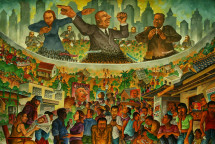Agriculture and migration in rural southern Italy in the 2010s: new populisms and a new rural mutualism
Topics
Regions
What features do the emergent forms of authoritarian populism assume in Italy?

Authors
We look at the centre-left Italian governments in the 2010s (2013-2018) and at their attempt to build a new consensus based on a combination of old and new populist and neoliberal traits. In particular, we explore two issues: 1. a struggle for hegemony over the representations of Italian agriculture; 2. the “military-humanitarian” management of the “migration crisis” and its consequences on migrant farm labour. Both of these have emerged as responses to two deep “crises”: in the domain of agriculture, the crisis of Italian small and medium farming, due to their incorporation into a neoliberalizing food regime since the 1980s; in the domain of migration, the “migration/refugee crisis” started with the “Arab springs” in 2011.
After a description of four “great transformations” which have characterized Italian agriculture and rural areas since the 1980s in the context of the transition towards a new, neoliberalizing regional food regime (second section), in the third section we analyse how: (1) the representation of Italian agriculture is apparently dominated by the rhetoric of the “Made in Italy” food, with its features of “quality”, “ties with the territory”, “peasantness”, “biodiversity”, and, interestingly, a growing attention to the defence of (migrant) farm labour; (2) this new discourse concerning the defence of labour rights has been developed in a new phase of migration processes, started in 2011, and managed by the Centre-Left governments through a “military-humanitarian” approach.
We argue that the Centre-Left policies in the 2010s failed in tackling the structural reasons of both small farmers’ marginality and the “migrant crisis”; these failures contributed to the defeat of the centre-left coalition in the political elections in 2018, probably paving the way towards a new era of authoritarian populism. In Section 4, we discuss a possible political alternative “from below” to both the centre-left rhetoric and centre-right authoritarian populism: new forms mutualism and peasant agriculture, animated by small-scale farmers, local and migrant precarious workers and activists, emerged in southern Italy since 2011.
This paper was presented at the Emancipatory Rural Politics Initiative (ERPI) 2018 Conference: "Authoritarian Populism and the Rural World"